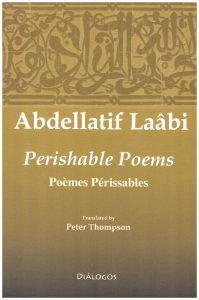The Symphony of Resistance, poetry
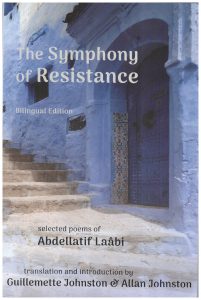
Translation and introduction by Guillemette Johnston & Allan Johnston, english-french ; Shanti Arts Publishing (Brunswick, Maine, USA), 292 p., 2024.
Near Nothings (“Presque riens”), poetry

Translated by Guillemette Johnston & Allan Johnston ; introduction by Khalid Lyamlahy ; french-english ; Diálogos (New Orleans, USA), 234 p., 2024. Cover : painting of Abdellatif Laâbi.
Hope on the Fly (“L’Espoir à l’arraché”), poetry
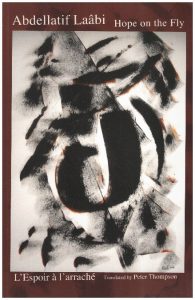
Translation by Peter Thompson, french-english ; Diálogos Books (New Orleans, USA), 183 p., 2022. Cover : painting of Abdellatif Laâbi.
My Mother’s Language (“La Langue de ma mère”), poetry
Translation and introduction by André Naffis-Sahely ; afterword by Yousif M. Qasmiyeh ; french-english ; Poetry Translation Centre, London (UK),
65 p., 2021.
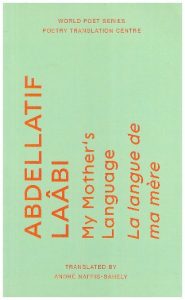
The Uncertainty Principle (“Le Principe d’incertitude”), poetry
Translation by Annie Jamison, french-english ; Lithic Press, Fruita, Colorado (USA), 128 p., 2021.
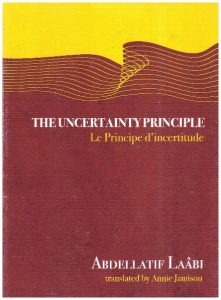
My Dear Double (“Mon Cher Double”), poetry
Transference is an annual publication of the Department of World Languages and Literatures (Western Michigan University).
In the Volume 8 (2020), Allan and Guillemette Johnston had published
a translation of Mon Cher Double (Part I), followed by a study on this collection.
Both translators had already translated « The Shoulders and the Burden » from the poetic collection Tribulations d’un rêveur attitré, also followed by
a commentary (Transference, Volume 7, 2019).
https://scholarworks.wmich.edu/transference/
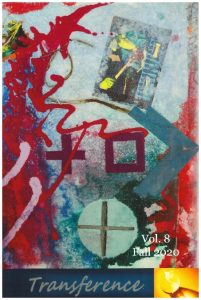
Perishable Poems (“Poèmes périssables”), poetry
Translation and foreword by Peter Thompson, french-english ; Diálogos Books (New Orleans, USA), 213 p., 2019
In Praise of Defeat, poetry
Poems Selected by the Author, french-english, foreword by Pierre Joris ; translated by Donald Nicholson-Smith, Archipelago Books (New York, USA), 824 p., 2016
International shortlist of the Griffin Poetry Prize 2017 (Toronto)
Finalist for Best Translated Book Award 2017
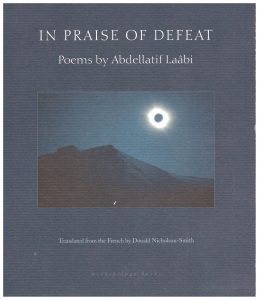 «Abdellatif Laabi is one of the most famous of the Moroccan poets who wrote in French and whose work can be considered roughly postcolonial in both its political fervor and in its searching explorations of identity, power, and history. Here we have a massive collection of his major poems from 1965 to very nearly the present, brought together by the poet and his translator Donald Nicholson-Smith together. With characteristic attention to detail and integrity, independent press Archipelago Books has published In Praise of Defeat in a handsome en face edition, meaning that the original French text appears facing Nicholson-Smith’s translation — a feat of generosity and courage by both Archipelago’s publisher Jill Schoolman and Nicholson-Smith, who has said publicly that he welcomes and actively wants to enable reader second-guessing. Since the selection was made by the poet himself, this is a book that currently exists in English only. The result is a major event in the history of francophone literatures of Africa and a survey of a body of poetry that is by turns scarifying, lyrical, ardent, and ferocious. » (Michael Lindgren, 2017)
«Abdellatif Laabi is one of the most famous of the Moroccan poets who wrote in French and whose work can be considered roughly postcolonial in both its political fervor and in its searching explorations of identity, power, and history. Here we have a massive collection of his major poems from 1965 to very nearly the present, brought together by the poet and his translator Donald Nicholson-Smith together. With characteristic attention to detail and integrity, independent press Archipelago Books has published In Praise of Defeat in a handsome en face edition, meaning that the original French text appears facing Nicholson-Smith’s translation — a feat of generosity and courage by both Archipelago’s publisher Jill Schoolman and Nicholson-Smith, who has said publicly that he welcomes and actively wants to enable reader second-guessing. Since the selection was made by the poet himself, this is a book that currently exists in English only. The result is a major event in the history of francophone literatures of Africa and a survey of a body of poetry that is by turns scarifying, lyrical, ardent, and ferocious. » (Michael Lindgren, 2017)
«A career-spanning collection of poetry from Morocco’s poet of protest, In Praise of Defeat gives the reader a time-lapse tour of Abdellatif Laâbi’s expansive poetic voice in development.» (World Literature Today)
«We should not reach for In Praise of Defeat to assuage our fear and anger at the current administration, but we should reach for this book, and for Laâbi’s works in general, to seek strength and courage to nourish for own resistance.» (Zyzzyva)
«In Praise of Defeat allows us the rare pleasure of watching a revolutionary mind work tirelessly over time and through all manner of political weather in pursuit of that route — it’s a towering demonstration of what it means to make poetry, and its capacity to dignify and elevate the small and sometimes miserable details of struggle into a practice of struggle.» (Ryan Kaveh Sheldon, American Book Review)
«Brilliantly and feelingly translated by Donald Nicholson-Smith, this collection has been nominated for the Best Translated Book Award, and if there’s any justice in the world, it will win it.» (Jewish Currents)
«Each poem testifies to Laâbi’s revolt against silencing, oppression, and exclusion, promoting an alternative world based on resistance, love, and commitment…Laâbi reaffirms the ability of poetry to transcend borders, celebrate human desires, and denounce atrocities and horror, from Madrid to Baghdad.» (The Poetry Review – UK)
«Laâbi is by some credited … with re-invigorating French poetry and outdoing the poets of metropolitan France… Laâbi’s writing has become a constant taking stock in relation to the ominously changing world, continually raiding the inarticulate, pitting himself against ‘aphasia’ and the self-imputation of failure, painting an apocalyptic picture but eventually sounding the soft music of hope… In Praise of Defeat is a lovable brick of 800+ pages…» (Leslie Bell, PN Review)
«Laâbi spent several years in prison and then was exiled. Through it his poetry has remained distinctly humane, reachable, direct and impassioned. Somehow Laâbi has been able to find light in a world determined to regale the force of darkness.» (Michael Dennis, Today’s Book of Poetry)
«Keeping pace with the long poems that are Abdellatif Laâbi’s distinctive achievement – the poems of torture and imprisonment in Morocco, or ‘People of Madrid, Pardon’ written in response to the train bombings of 2004 – an English-speaking reader like me inevitably keeps waiting for the public voice, the high style of anger and compassion, to falter or overreach. But Laâbi’s voice does neither. Donald Nicholson-Smith’s translations hold fast to this poetry’s unnerving eloquence and simplicity, and its hell-for-leather speed.» (T.J.Clark)
«Laâbi’s poetic voice consistently raises a song of possibilities above the dirge of cruelty.» Victor Reinking
«The great power and subtlety of the work lies in the fine balance it strikes between that Peter Pan-like sensitivity, vulnerability and imagination, and the brutality of the real world, history and politics.» The Daily Star (Lebanon)
«That Laâbi recognizes the link between understanding our time and understanding memory is profound, and should serve as an example to other authors.» Jordan Anderson, The Coffin Factory
«As the new collection In Praise of Defeat, deftly translated by Donald Nicholson-Smith, shows, Laâbi’s early poems are poems of protest and of incarceration. They powerfully evoke the need for poetry to bear witness…In Praise of Defeat presents a poet-activist who was born in the direst possible circumstances, survived them, and has continued on a trajectory of art and activism. He shows any poet how the artistic space created by “poet, activist, former prisoner, exile” is the space where the most crucial acts of art happen.» (Emily Wolahan, The Quarterly Conversation)
«As In Praise of Defeat shows, Laâbi’s early poems are poems of protest and of incarceration. They powerfully evoke the need for poetry to bear witness.» (Two Lines Press)
«Laâbi has always been interested in inviting his readers to imagine what it would look like for a society to publicly honor, rather than privately imprison, the poets responsible for unmaking its own language.» (Max Nelson, The Paris Review)
Beyond the Barbed Wire, poetry
Translated by André Naffis-Sahely, Carcanet (UK), 2016
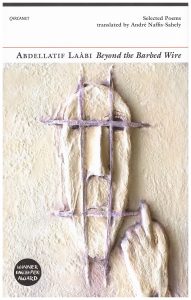
Little Things (“Les Petites Choses”),
extract of “Le soleil se meurt”, poetry
Translated by Alan Baker, Leafe Press (Nottingham, UK), 2013
“It writes
from right to left
from left to right
It’s called migratory language”
The Bottom of the Jar (“Le Fond de la jarre”) , novel
Translated by André Naffis-Sahely, Archipelago Books (New York, USA), 2013
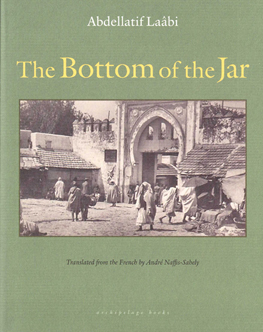
«Laâbi’s narrative draws deeply on his own childhood in Fez during the late 1940s and especially the 1950s. The writer has a fine eye for the telltale details of daily life, for the personality traits of colorful characters, for the labyrinthine urban layout of the town. The Bottom of the Jar is one of the most evocative portraits of the town that has ever been written.»
John Taylor, Fuse Book Review,
«At once classic (in tone) and modern (in form), The Bottom of the Jar is imbued with humor and a sensibility that gives it a certain magic. The result: two hundred fifty pages of pure pleasure.»
La Vie économique (Morocco)
«A valuable book: inventive and philosophically amusing, it assures us that despite dark times, human virtue still shines in Maghreb with a clarity that is unquestionably brightest in the old city of Fez.»
(J.M.G. Le Clézio, winner of the Nobel Prize )
«The Bottom of the Jar is an authentic and beautiful bildungsroman in which life and political struggle take place in one space, with the demand for Moroccan independence joining the need for personal emancipation in a sublime way. »
Quotidien national
«Created with gentleness and with fury, with words that thrill the soul, that cry out with the urge to live, with hope and with suffering.»
Jeune Afrique
«The great power and subtlety of the work lies in the fine balance it strikes between that Peter Pan–like sensitivity, vulnerability and imagination, and the brutality of the real world, history and politics.»
The Daily Star (Lebanon)
The Rule of Barbarism (“Le Règne de barbarie”),
poetry
Translated by André Naffis-Sahely, Island Position (Brooklyn/Gorée/Maastricht), 2012
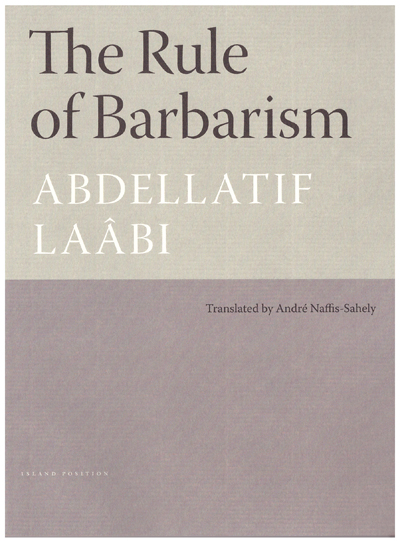
One of the most daring poetic visions of the second half of the twentieth century. The Rule of Barbarism is a devastating flight through consciousness, acquainting the reader with the trials of a society caught between a colonial past and the tragic realities of a brutal dictatorship. Analysing the presence of “barbarism” inherent in all of us, and yet deepening our capacity for compassion despite the allure of revenge, this stunning debut from a writer on the threshold of a groundbreaking career can be read as an epic of love, empathy, anger and despair – and is as resonant today as when composed nearly fifty years ago.
The Jackal’s Baptism (“Le Baptême chacaliste”), play
Translated by Gordon and Nancy Hadfield, Mayday Magazine (Ontario, Canada), 2010
Fragments of a forgotten genesis
(“Fragments d’une genèse oubliée”), poetry
Translated by Nancy and Gordon Hadfield, Leafe Press (Nottingham, UK), 2009
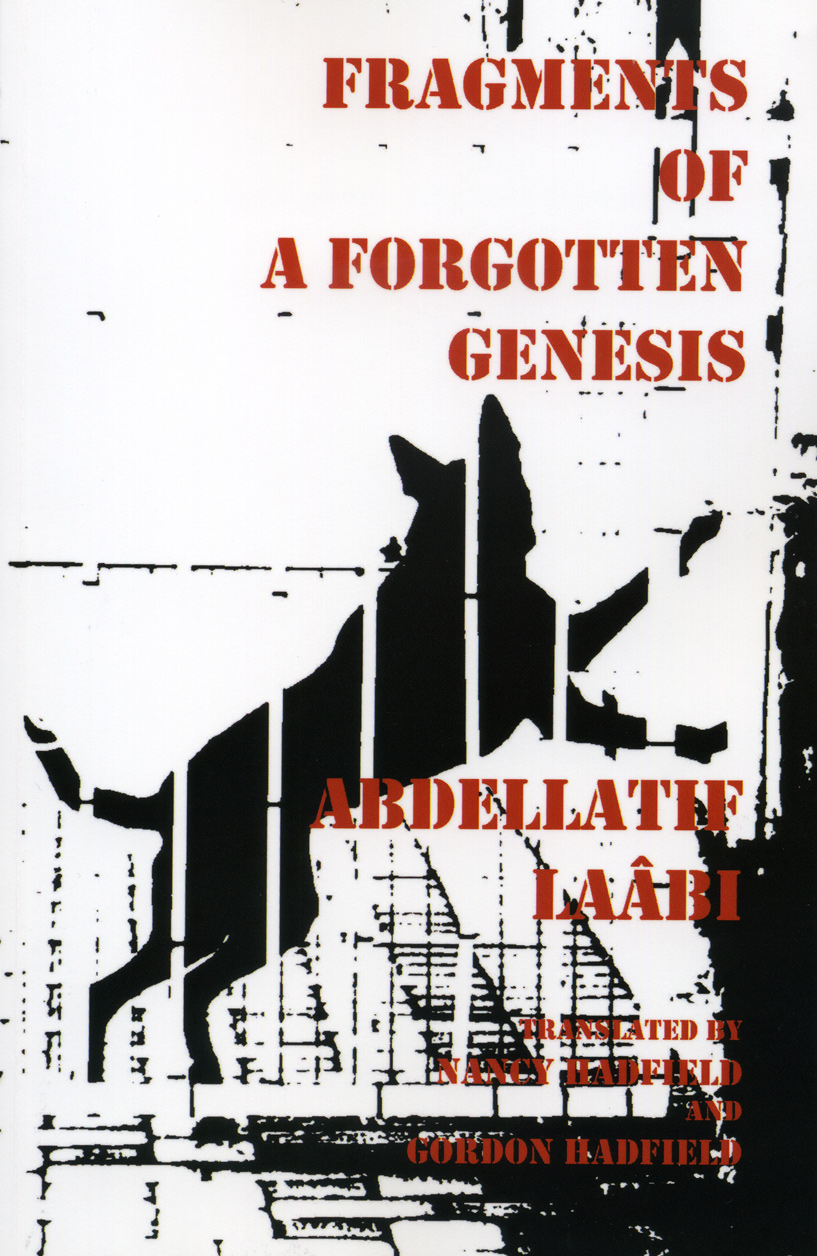
«Abdellatif Laâbi, without a doubt the major francophone voice in Morocco today, writes with a quiet, unassuming elegance that holds and hides the violence any act of creation proposes. This is doubly true in his retelling of this story of a Forgotten Creation — is it a fragmentary story or the full story of a fragmentary creation?»
Pierre Joris
The World’s Embrace, (“L’Etreinte du monde”), selected poems
Translated by Anne George, Edris Makward, Victor Reinking and Pierre Joris, City Lights Books, San Francisco, 2003
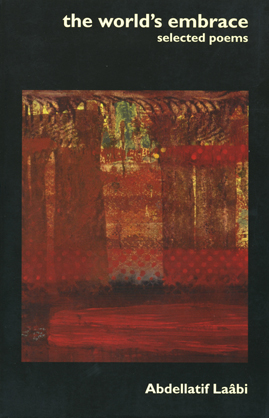
«He moves with ease from the elegiac to the whimsical, or from the intensely personal to the proverbial. Much of his longer works are poems of witness and remembrance and, in prophetic moments, reflect a vision of the whole teeming, suffering human continent in its quest for healing and harmony.»
Victor Reinking, Introduction
Rue du Retour (“Le Chemin des ordalies”), novel
Translated by Jacqueline Kaye, Readers International, London, 1989
New edition 2017
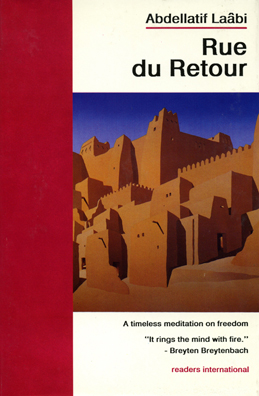
«The narrative structure of Rue du Retour is impressively intricate. The author renders the complexity of the political prisoner’s thoughts and emotions by skillfully blending childhood memoirs, love letters to his beloved, graphic descriptions of prison life (especially of torture), dreams, visions, even bits of political propaganda. More than a testimony and a plea, this intense prose poem often attains a hallucinatory fervor.»
John Taylor, San Francisco Chronicle, October 1989
«Fire. Germination. Birth. Blood. All these themes are burnished and boned image by image until they echo through Abdellatif’s book…. Abdellatif Laâbi, as you will see, is a member of the same cell as Dostoevsky, Hikmet, Soyinka, Cervantes…»
Breyten Breytenbach
